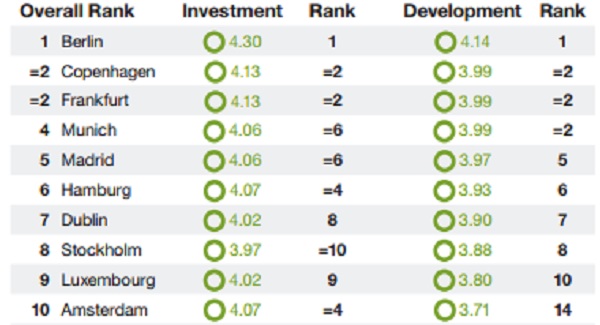
For the very first time, Luxembourg City has gained a place in the Emerging Trends Europe rankings, coming in ninth position for most attractive European cities for real estate.
Luxembourg has joined the cities of Berlin, Frankfurt and Munich as the first investment and real estate development cities in 2018, according to the report Emerging Trends in Real Estate® Europe 2018. The annual survey, jointly published by the Urban Land Institute (ULI) and PwC, is based on the responses of more than 800 real estate professionals in Europe including investors, developers, creditors, real estate agents and consultants. The report ranks real estate markets in major European cities according to their overall investment and development prospects.
For the fourth time in a row, Berlin has been ranked the no. 1 most attractive European city, confirming its supremacy on the European real estate market. Frankfurt came in second place, benefiting from a year of solid property growth tied in the ranking with Copenhagen which has benefitted from the attention of the international real estate industry thanks to a growing residential sector. In fourth place was the city of Munich, which, while remaining in the high end of the market, remains an attractive market for investors and developers.
Meanwhile, the city of Luxembourg has entered the rankings for the first time, propelling itself into the top 10 most attractive cities. Thanks to GDP growth of 4%, a stable economy and an open market, an increasing number of international companies seem willing to invest in the country. Moreover, with Brexit behind the scenes, the capital of the Grand Duchy is proving to be an attractive alternative to London, according to respondents to the survey.
However, Luxembourg’s high cost of living was identified as one of the major drawbacks by survey respondents, as were infrastructure concerns, highlighting the possible lack of housing or educational facilities able to absorb a possible influx of companies into the country.
The report also points out that the activities of the real estate industry have become more complex due to more demands and the emergence of collaborative workspaces. These expectations imply that real estate companies will have to resort to new skills to exploit large computer data and use digital to better support the decision to purchase, property management or property valuation. Brexit also remains an issue for the real estate industry with the uncertainty surrounding UK's exit terms from the EU as a source of frustration for real estate professionals.
The top ten European investment and real estate development markets in 2018 were: Berlin; Copenhagen and Frankfurt; Munich; Madrid; Hamburg; Dublin; Stockholm; Luxembourg; Amsterdam.








